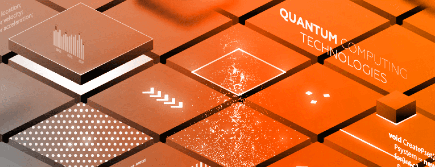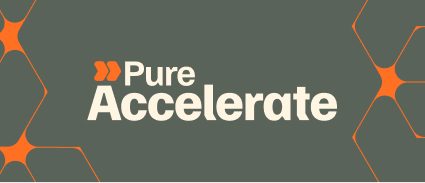Dismiss
Innovation
A platform built for AI
Unified, automated, and ready to turn data into intelligence.
Dismiss
June 16-18, Las Vegas
Pure//Accelerate® 2026
Discover how to unlock the true value of your data.
Dismiss
NVIDIA GTC San Jose 2026
Experience the Everpure difference at GTC
March 16-19 | Booth #935
San Jose McEnery Convention Center
What Is Quantum Computing

What Is Quantum Computing?
Quantum computing is the use of quantum mechanics, the behavior and description of atomic and subatomic particles, as a means of holding and transmitting information in computer processing.
How Do Quantum Computers Work?
Traditional computing uses transistors that can represent two different states: 1 or 0. Quantum computing discerns variations in the behavior of particles to measure a far greater number of values, increasing potential computational power, speed, and efficiency.
When used this way, the particles are called “qubits.” And while linking together more transistors only increases computing power linearly, linking qubits together increases computing power exponentially. This is what makes quantum computing’s astonishing leaps in performance possible.
Why Is Quantum Computing Important?
In the near future, quantum computing could become a supercomputing technology for revolutionising some industries and leading to the birth of others. But of more interest is quantum computing’s potential to disrupt and even upend technologies currently in use for cybersecurity and data management—specifically encryption. In fact, anyone with an operational quantum computer would potentially have a way to decrypt at will. The bad guys also love the potential of quantum computing.
The applications of faster computing range from much better cybersecurity to significantly improved customer experiences—and in fact, anything else that requires a lot of computing power to quickly produce a result.
Quantum computing also has incredible value for machine learning and artificial intelligence. Since quantum computers can run through endless scenarios at an incredibly fast pace, they have the potential to learn how to become essentially the best possible versions of themselves for whatever central mission or task they’ve been assigned.
The ramifications for cryptocurrencies and blockchain technology are also readily apparent. At some point, as quantum computing draws nearer, organisations of all kinds will have to update IT systems to prepare and secure them from quantum computing-equipped encryption attackers.
What Is Quantum Computing Used For?
The potential benefits of quantum computing are immense. Scientists in many fields see quantum computing as a solution to challenges previously thought impossible—for example, gaining a deeper understanding of chemical reactions, more detailed simulations of complex artificial and natural systems, and the design and creation of new molecules.
In the near term, the energy efficiency of quantum computing is of enormous interest, offering a solution for operating AI and other power-hungry technologies in a more sustainable manner.
The computational power of quantum computing can also assist the development of AI. Current AI models are being trained with data created by traditional computing, the only kind of data we have. So, in effect, quantum computing can be seen as overkill as a way to train with such “coarse” data. To truly realize the potential of quantum AI, we’d need a corpus of data created by quantum applications in use by millions of users for a few decades.

Test Drive FlashBlade
No hardware, no setup, no cost—no problem. Experience managing an Everpure FlashBlade, the industry's most advanced solution delivering native scale-out file and object storage.
What’s the Current State of Quantum Research?
In the nearly 40 years since physicist Richard Feynman first proposed the idea of quantum computing, computer scientists have made steady, if slow, progress in bringing the technology to life. The early to mid-2020s have seen major announcements from different teams working on quantum computing. For example:
- In late 2023, Rigetti Computing released a nine-qubit quantum processing unit, the Novera QPU, intended for specialized research.
- In 2024, Canadian company Xanadu Quantum Technologies, using qubits made of photons, released what it describes as the world's first modular, scalable, and networked quantum computer and software to go with it that allows development of quantum applications.
- Also in 2024, Google announced Willow, its latest quantum chip. Willow can reduce errors exponentially as it is scaled up using more qubits. This cracks a key challenge in quantum error correction that the field has pursued for almost 30 years. In addition, Willow performed a standard benchmark computation in under five minutes that would take one of today’s fastest supercomputers 10 septillion (that is, 1024) years.
Limitations and Challenges of Quantum Computing
Quantum computing poses many practical challenges. For one thing, it can require enormous capital expenditures. In addition, qubits are highly susceptible to interference from other qubits and require highly controlled environments—including extremely cold temperatures to operate at their theoretical potential. As a result of these requirements, quantum devices are, at least currently, extremely complex and expensive to produce.
There are also enabling technologies for quantum computing that still need further development, such as more advanced silicon photonics components, error correction that’s capable of chasing down subatomic particles, and single photon detectors and sensors.
Also, since quantum computing is still fairly new, it’s likely to render much of what we currently rely on—hardware and software alike—obsolete. Quantum computing will require new hardware designs, new operating systems, new software—and new data storage technologies.
We Also Recommend...
Browse key resources and events

TRADESHOW
Pure//Accelerate® 2026
June 16-18, 2026 | Resorts World Las Vegas
Get ready for the most valuable event you’ll attend this year.
PURE360 DEMOS
Explore, learn, and experience Everpure.
Access on-demand videos and demos to see what Everpure can do.

VIDEO
Watch: The value of an Enterprise Data Cloud
Charlie Giancarlo on why managing data—not storage—is the future. Discover how a unified approach transforms enterprise IT operations.
RESOURCE
Legacy storage can’t power the future
Modern workloads demand AI-ready speed, security, and scale. Is your stack ready?
Personalize for Me